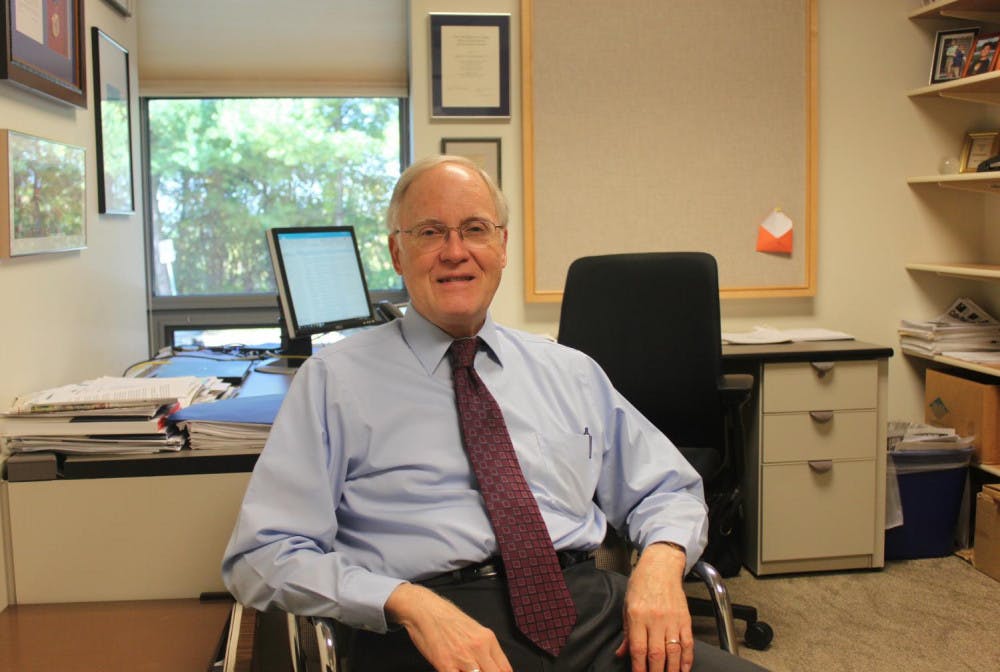When Jim Douglas ’72 published an autobiography in 2014, he gave it a subtitle: “A Republican Governor Leads America’s Most Liberal State.” Navigating those competing ideological demands has indeed been one of the central tasks of Douglas’s long career in Vermont politics, which reached its pinnacle when he was elected Governor in 2002. Though Douglas retired following his fourth term in 2011 and became an executive in residence at the college, he remains active in state politics. Douglas spoke with Nick Garber ’19, The Campus’s managing editor, about what still distinguishes Vermont from other states, and what it means to be a Republican in the Age of Trump.
What kind of involvement have you had in this election cycle?
I haven’t been that involved. I often encourage Republicans to not drag out folks from the past but to look to the future and involve people who are up and coming, not those of us who have come and gone.
How does the up-and-coming crowd compare with the come-and-gone crowd?
There’s not a big bench in the Republican Party in Vermont. You may have heard about the experience that the party had in filling its statewide slate this year, where one fellow, Brooke Paige, won six nominations. It’s tough. I was in the legislature when the majorities would move back and forth, but today it’s overwhelming Democratic majorities. It’s very unlikely that we’ll send a Republican to Congress in the near future.
When you support Republican campaigns, how much of that support is based on your personal ties to the candidates, as opposed to your ideological agreement with them?
It’s more the former. I write a number of letters to newspapers for candidates I know around the state. For someone I don’t know, I can learn about the candidate and feel comfortable doing it, but the letters probably aren’t as fervent. As time goes on, I’ll know fewer people who are actively engaged in politics, and fewer people will know me and care about whether I’m supporting them or not.
When you speak with other former governors across the U.S., how do you think that compares to how politics operates in other states?
There’s a couple of interesting examples. The Republican Governor of Nevada, who is term-limited, has not indicated support for the Republican candidate to succeed him. I think it’s because the candidate has made it very clear that he plans to undo some of the things the incumbent has done. In Kansas, there’s a former Republican governor whom I know who’s endorsed the Democrat [Laura Kelly] in the campaign this year, and I’ve discussed it with him. His public statement was “I’ve known her forever and she’s a good friend,” but I think there was probably an ideological factor there as well. (Editor’s note: the Republican nominee for Governor in Kansas is Kris Kobach, a right-wing conservative whose views on immigration and voting rights have alienated some moderates.)
Do you think that Vermont’s style of “personal politics” is sustainable?
I think it’s easier here than other places because of our size. Here, people can meet candidates for statewide office if they try, and sometimes even if they don’t. So there’s an opportunity to become personally acquainted with people, or at least have a sense of who they are based on personal interactions.
For the past few years I’ve taken a group of freshmen on a MiddView trip to the Statehouse and several times we’ve met with the current governor. Students who come from big metropolitan areas are shocked — they’ve never met the governor of their state and they’ve met two here!
And frankly, as a Republican running in a blue state I swim upstream, and personal contact gives people the opportunity to see that I don’t have horns, I’m not necessarily affiliated with the national folks. That’s of real value and that’s why Republicans can succeed here.
When you or Gov. Scott is talking to a Democrat and trying to convince them to vote for you, how much of it is, “I’m a nice guy and I know you,” versus, “My ideology is actually aligned with yours”?
I think character counts. I’ve had a lot of people over the years say to me, “I don’t agree with you on this or that or anything, but you’re honest, you’re hard-working, you’ll act in the best interests of the state, so I’m going to vote for you.”
I was listening to some radio commentary this morning where people were wondering if there even is an election in Vermont this year, since it’s so overpowered by the national scene. You’ve got the governor running for his first re-elect, a Democratic candidate with no experience who is not engaging as much as I might have anticipated. It’s kind of a sleepy election, which is beneficial to an incumbent.
Beyond that, the latest poll I saw suggests that the governor’s popularity among Democrats is higher than it is among Republicans, due to his actions on the gun bills. The buzz is, will his more conservative base turn out?

Then-Governor Douglas (left) presented with a gift by Lt. General Abdoulaye Fall, the chief of defense staff in Senegal, in 2009.
There’s this phenomenon of deep blue states electing Republican governors, not only here but in places like Massachusetts and Maryland. I’ve seen some liberal commentators suggest that this is sort of shooting yourself in the foot if you’re a liberal voter — if the point of politics is to elect people who want to implement the policies that you favor, why are you voting for conservatives?
They are Republicans, but I’m not sure I would label any of those three governors conservative. There’s a Republican base in Vermont that’s quite conservative and I had people in the party that didn’t like me because I wasn’t a hardliner. I tried to say, “Look at which Republicans have won in Vermont in the past half century or so. They’re not all conservative.”
Given the national context, do Republicans in blue states need to go even further than you did to separate themselves?
Maybe my answer will be a little inconsistent. Phil Scott said early on in 2016, “I don’t like Donald Trump, I don’t share his views and values, I’m not going to vote for him.” The fellow who ran and won for Governor in New Hampshire, Chris Sununu, said, “I don’t agree with him on a lot of things, he has personal qualities that I don’t admire, but he’s the nominee of our party and I will vote for him.” Contrast that with my friend Kelly Ayotte, a former Senator from New Hampshire, who tried to parse a middle, on-the-fence course and she [lost in 2016]. So I think people appreciate honesty in this sense. Whatever your view is, state it, be consistent and people will respect that.
I had a similar albatross with George W. Bush, who got 39 percent here as opposed to Trump’s 29 percent — still, he was not very popular. My pitch to Vermonters who tried to tie me to him was, “Vermonters know that I’ll always do what’s best for the state.” If I’m aligned with President Bush, fine, if I’m not, fine. In 2004, my first re-election, while Dubya was on the ballot, my opponent tried to make the connection. He had these signs all over Chittenden County that said “Jim = George.” When I first saw them I got nervous, and my pollster said, “Pfft, that’s not going to make any difference.” Moderates are just not going to buy this guilt-by-association. So on Election Night 2004 I was particularly happy that President Bush got more votes in Vermont than my opponent did.
Can I ask who you voted for in 2016?
Oh, I haven’t told anyone. It’s between me and God.
Fair enough. When you look at what’s happening nationally, what differences do you observe between the Republican Party you joined as a young person and today’s party?
It’s not very satisfying. I’ve been to two national conventions, and it’s a very conservative crowd compared to Republicans as a whole — it’s the activists who take a week at their own expense to go to a national convention.
There’s always been differences within the party, even in Vermont, but in the old days it was more positive. Even fairly recently, if you were for McCain or Romney or Dubya, there was some rough and tumble in the primaries but still a general sense that these were all decent people. But the Trump effect is unusual, and causing a lot of stress and tension.
Even here, there’s been some increasing polarization, right?
Yes, I often say, “Things are better here than elsewhere, but not as good as they used to be.” I half-jokingly say that we shouldn’t have built interstate highways — now there are more legislators who commute. I stayed over in Montpelier during the week, and something about having dinner with colleagues, going to events in the evening, spending time with them, it makes it more difficult to bash them in debate the next day when the house is in session. Now, there’s so many who commute that they don’t build those relationships.
That’s certainly true in Washington, where they fly in Tuesday morning and fly home Thursday night. [Congressman] Peter Welch said to me, “I don’t even know all my fellow Democrats — just the ones on my committees.” You just don’t get to know them.
I wish I were more uplifting and optimistic, but I’m not sure how we get out of this. I’ve often wondered why things are the way they are now. Gerrymandering is one reason. And cable shows can’t attract an audience unless they’re provocative and edgy.
I tell a lot of folks, don’t let this consume your life — do your job, read a book, take a walk, love your family, get on with your life and don’t let it be overwhelmed by stressful national dialogue. It’s not good for your health.
I’m in the minority, but I didn’t watch a minute of the Kavanaugh hearings — I didn’t watch a minute of the Clarence Thomas hearings in ’91. Nothing I did was going to affect the outcome.
Former Vermont Gov. Jim Douglas Reflects on the GOP in 2018

NICK GARBER
Former Governor Jim Douglas, pictured in his office under Ross dining hall.
Former Governor Jim Douglas, pictured in his office under Ross dining hall.
THE NATIONAL GUARD
Comments



